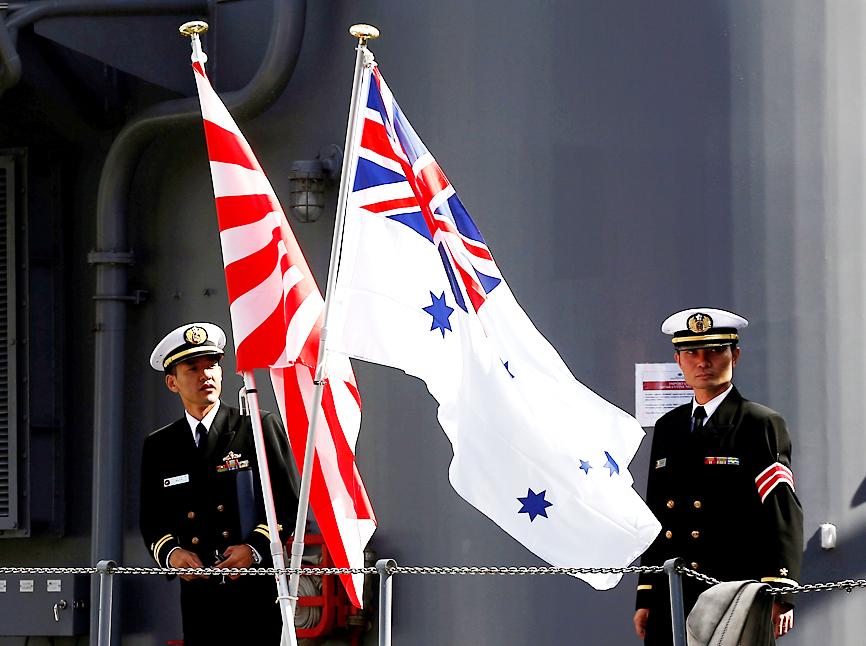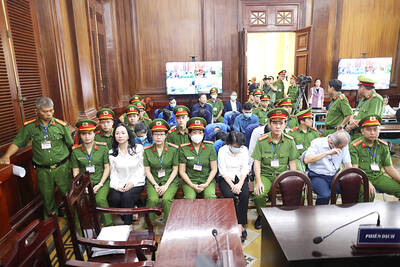Japanese Prime Minister Yoshihide Suga and his Australian counterpart, Scott Morrison, might today agree on a historic defense pact that would closely align two key US allies in Asia as a counter to China’s growing influence in the region.
Morrison on Tuesday last week arrived in Japan where security experts expect him to conclude a Reciprocal Access Agreement with Suga to establish a legal framework for each other’s troops to visit for training and to conduct joint military operations.
“There will be something to announce from the meeting,” a Japanese Ministry of Foreign Affairs official told a news briefing, without elaborating.

Photo: Reuters
A pact, which has taken six years to negotiate and would need to be ratified by lawmakers, would be the first such agreement for Japan since it signed a status of forces agreement in 1960 that allowed the US to base warships, fighter jets and thousands of troops in and around Japan as part of a military alliance that Washington describes as the bedrock of regional security.
In a call with Suga on Thursday last week, US president-elect Joe Biden said his incoming administration was committed to maintaining that partnership.
Tokyo and Canberra seeking closer ties comes as they worry about Chinese activity in the region, including militarization in the South China Sea, maneuvers around disputed islands in the East China Sea and Beijing’s growing sway over Pacific island nations further east.
“It’s helpful for other nations to take a more active role in military activities and operations in the region, not least as the Americans are overstretched,” said Grant Newsham, a research fellow at the Japan Forum for Strategic Studies.
To counter China, Suga last month visited Vietnam and Indonesia to bolster ties with key Southeast Asian allies. That followed a meeting in Tokyo of foreign ministers from the Quad, an informal group of Australia, Japan, India and the US.
China, which insists its intentions in the Asia-Pacific region are peaceful, described the Quad, as a “mini-NATO” aimed at containing it.
While Japan sees India as more hesitant to deepen ties, it has pushed for greater defense cooperation with Australia since a 2007 joint statement on cooperation.
In 2013, Japan and Australia also agreed to share military supplies, which was broadened in 2017 to include munitions.
Although Japan renounced the right to wage war after World War II, its Self-Defense Forces are one of Asia’s biggest and most modern militaries, with stealth fighters, helicopter carriers, submarines and amphibious units that the US Marine Corps helped train.
Australia is also a significant regional military power, with a carrier-borne amphibious force it can dispatch on overseas missions.

Republican US lawmakers on Friday criticized US President Joe Biden’s administration after sanctioned Chinese telecoms equipment giant Huawei unveiled a laptop this week powered by an Intel artificial intelligence (AI) chip. The US placed Huawei on a trade restriction list in 2019 for contravening Iran sanctions, part of a broader effort to hobble Beijing’s technological advances. Placement on the list means the company’s suppliers have to seek a special, difficult-to-obtain license before shipping to it. One such license, issued by then-US president Donald Trump’s administration, has allowed Intel to ship central processors to Huawei for use in laptops since 2020. China hardliners

A top Vietnamese property tycoon was on Thursday sentenced to death in one of the biggest corruption cases in history, with an estimated US$27 billion in damages. A panel of three hand-picked jurors and two judges rejected all defense arguments by Truong My Lan, chair of major developer Van Thinh Phat, who was found guilty of swindling cash from Saigon Commercial Bank (SCB) over a decade. “The defendant’s actions ... eroded people’s trust in the leadership of the [Communist] Party and state,” read the verdict at the trial in Ho Chi Minh City. After the five-week trial, 85 others were also sentenced on

‘DELUSIONAL’: Targeting the families of Hamas’ leaders would not push the group to change its position or to give up its demands for Palestinians, Ismail Haniyeh said Israeli aircraft on Wednesday killed three sons of Hamas’ top political leader in the Gaza Strip, striking high-stakes targets at a time when Israel is holding delicate ceasefire negotiations with the militant group. Hamas said four of the leader’s grandchildren were also killed. Ismail Haniyeh’s sons are among the highest-profile figures to be killed in the war so far. Israel said they were Hamas operatives, and Haniyeh accused Israel of acting in “the spirit of revenge and murder.” The deaths threatened to strain the internationally mediated ceasefire talks, which appeared to gain steam in recent days even as the sides remain far

The Taliban’s reclusive supreme leader made a rare public appearance yesterday, an Afghan government spokesman said, leading thousands of worshipers in prayers marking Eid al-Fitr. Hibatullah Akhundzada has made only a handful of public appearances since inheriting the leadership of the Taliban in 2016 and leading the movement back to power with the withdrawal of US forces in 2021. Taliban government spokesman Zabihullah Mujahid said prayer in the largest mosque in Kandahar was “performed under the leadership of the supreme leader.” In a statement on X, he said the early-morning service “was attended by thousands of compatriots” in the southern province considered the